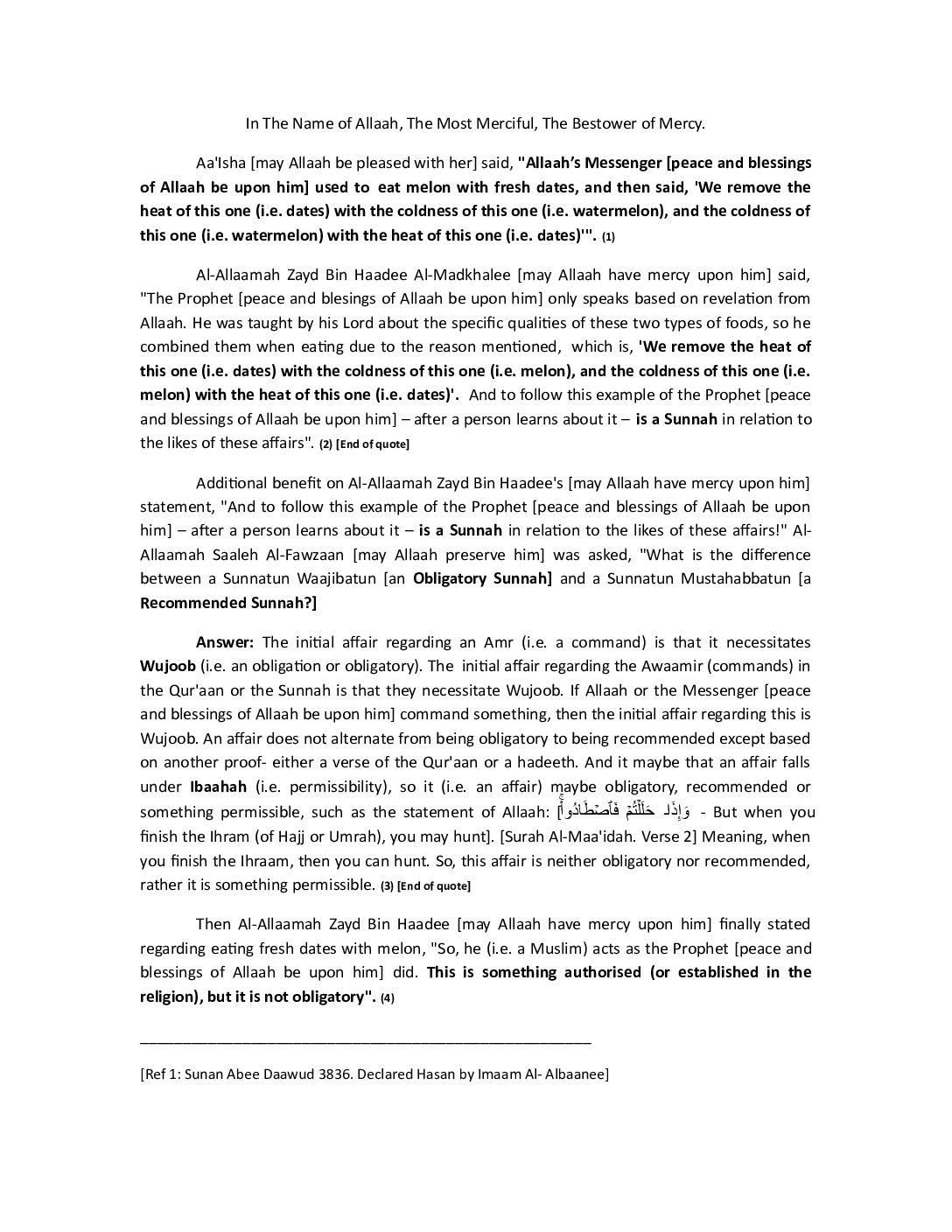After Me You Will See Others Given Preference to You, So Be Patient Till You Meet Me at The Haud
In The Name of Allaah, The Most Merciful, The Bestower of Mercy.
The Prophet [sallal-laahu-alayhi-wasallam] said, “After me you will see others given preference to you, so be patient till you meet me at Al-Haud [the pond (i.e. Al-Kauthar)] (on the Day of Resurrection]”. [Bukhaari]
It has (also) been reported in the Saheehayn [Bukhaari and Muslim] on the authority of Ubaadah Bin As-Saamit [radiyallaahu-anhu] who said, “We gave the Bai’ah (pledge) to Allaah’s Messenger that we would listen to and obey him both at the time when we were active and at the time when we were tired”. “And that we would not fight against the ruler or disobey him, and would stand firm for the truth or say the truth wherever we might be, and in the Way of Allah we would not be afraid of the blame of the blamers”. [End of ahaadeeth]
Indeed, the Prophet [sallal-laahu-alayhi-wasallam] commanded the Muslims to exercise patience when others are given preference to them. They [must] obey their rulers in [good]- even if others are given preference to them- and should not challenge the authority [of the rulers]. Many of those who rebel against the rulers or most of them only do so when others are given preference to them, so they do not exercise patience when this occurs. Then it may be that the ruler has other sins [i.e. sins committed openly], so the person’s hatred – due to others being given preference to him – leads him to inflate those [other sins of the ruler] and thus he fights the ruler, [whilst] thinking that he is fighting for the sake of stopping fitna and so that the religion is sincerely established for the sake of Allaah alone. However, the greatest drive behind this [path of his] is to achieve his goals – either to seize power or [obtain] wealth, just as Allaah [The Most High] said: [فَإِنْ أُعْطُوا مِنْهَا رَضُوا وَإِن لَّمْ يُعْطَوْا مِنْهَا إِذَا هُمْ يَسْخَطُونَ – If they are given part thereof, they are pleased, but if they are not given thereof, behold! They are enraged! [Surah At-Tawbah’ Ayah 58]
In the Saheehayn, the Prophet [sallal-laahu-alayhi-wasallam] said, “There will be three [types] of people whom Allaah will neither speak to them on the Day of Resurrection nor will He purify them [from sins], and they will have a painful punishment. [They are]: a man who had superfluous water on a way and withholds it from the wayfarers. And a man who sells something to another man after Asr and swears by Allaah [with a false oath] that he has been offered so much for it, whereas the buyer believes him and buys it although the seller has not been offered such a price. And a man who gives a pledge of allegiance to an Imam [i.e. a ruler] and only gives it for worldly [gains]; if he is given he fulfils his pledge, and if he is not given, he does not fulfil it”. [Muslim]
However, when Shub’hah [i.e. an affair that resembles the truth but is falsehood in reality] and Shah’wah [i.e. evil desires] come together, fitna arises. The Prophet [sallal-laahu-alayhi-wasalam]- the one who conveyed Allaah’s legislation- commanded [us] with everything that will lead to rectification [or well-being] for an individual and the Muslims, therefore, he commanded the rulers to be just and sincere to their subjects to the extent that he [sallal-laahu-alayhi-wasallam] said, “Any man whom Allaah has given authority of ruling some people and he does not look after them in an honest manner, [Allaah] will forbid him from entry into paradise”.’ [Bukhaari] [i.e. the one who dies and failed to repent from this major sin, he is left under the will of Allaah. Allaah will either punish him or forgive him; but if punished, he will not remain in the fire forever. This applies to all major sins that are lesser than Shirk…see link regarding this affair: http://www.wrightstreetmosque.com/the-two-shaikhs-ibn-baaz-al-fawzaan-on-the-position-of-ahlus-sunnah-regarding-a-person-committing-major-sins-not-making-takfeer-of-the-sinners/
And he [sallal-laahu-alayhi-wasallam] commanded the subjects to obey [the rulers in good] and to give them advice, as reported in the Bukhaari and Muslim: “The Religion is Naseeha (sincerity and sincere advice).” We said, “To whom?” He said, “To Allaah [i.e. sincerely worship Allaah alone and not to ascribe partners with Him]; to His Book [i.e. sincerely belief in the Qur’aan, affirm everything it has stated and negate everything it has negated, and judge by it in all affairs]; to His Messenger [i.e. obey the Messenger, believe in everything he has stated and keep away from what he has forbidden]; and [being sincere] to the leaders of the Muslims [i.e. obey the rulers in good, supplicate for them, refrain from rebelling against them, give them sincere advice in private etc ] and their general people [i.e. love for the Muslims what you wish for yourself, repel harm from them, advise them, teach them, stop them from evil, aid them when they need help etc]
He [sallal-laahu-alayhi-wasallam] commanded [the believers] to exercise patience when others are given preference to them and forbade them from fighting the rulers. He [forbade them from] challenging their authority, even though the [rulers] commit oppression. That is because the corruption that results from fighting them is greater than the oppression they commit; therefore, a lesser corruption is not to be repelled if it will lead to a greater evil. See link: http://www.abukhadeejah.com/the-tyranny-of-the-rulers-a-reason-for-rebellion/
How to advice the rulers:
http://salafipublications.com/sps/sp.cfm?subsecID=MNJ16&articleID=MNJ160003&articlePages=1
http://salafipublications.com/sps/sp.cfm?secID=MNJ&subsecID=MNJ16&loadpage=displaysubsection.cfm
[Source: An Excerpt from ‘Silsilah Ar-Rasaa’il Al-Manhajiyyah Fin-Nus’hi Wal-Irshaad Wat-Taw’iyah’ pages 34-38. slightly paraphrased]


